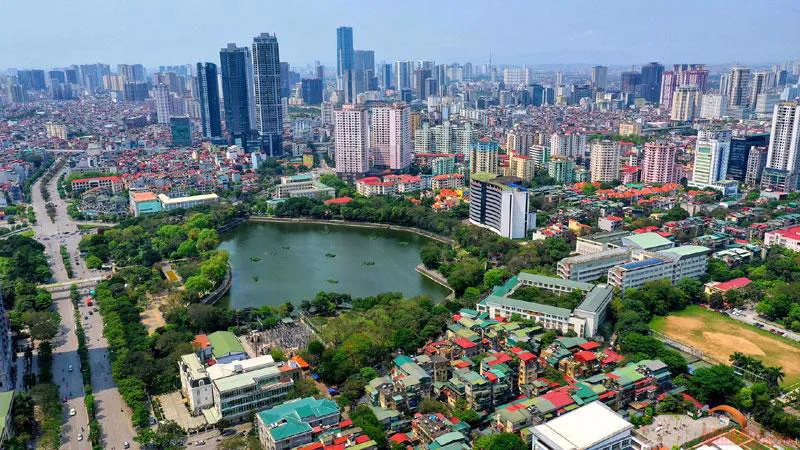Hanoi eyes more economic zones and satellite cities
The authorities of Hanoi define the construction of satellite cities and economic zones as key to the city's sustainable urban development.
Hanoi will build more economic zones and satellite cities to become the growth engine of the northern region, Vice Chairman Duong Duc Tuan said on November 30.
| The birdview of Ngoc Khanh Ward in Hanoi's Ba Dinh District. Photo: Le Viet/The Hanoi Times |
The city will improve infrastructures for socio-economic development and execute key transport projects that connect Hanoi with other provinces and regions, Tuan told a national conference on urban planning.
Among the key projects, Hanoi will give priority to the construction of Ring Road 4, he said. The 112.8-kilometer road running through Hanoi and the Hung Yen and Bac Ninh provinces will link the Hanoi-Lao Cai expressway with the Noi Bai – Ha Long expressway.
To facilitate the implementation of projects, Hanoi will propose amending laws on the capital's development, urban and rural planning administration, and land and housing management, the vice chairman said.
Local authorities will also speed up the implementation of several construction plans for the capital in the 2021-2030 period with a vision to 2050, Tuan said.
"The construction plans will be integrated into the National planning and the Red River delta development plan as well as others on the development of relevant sectors," Tuan said.
According to the Vice Chairman of the Hanoi People’s Committee, strong investment in urban development has brought a facelift for the capital city after the merger with Ha Tay Province in August 2008.
Hanoi has undertaken drastic measures to develop road infrastructure, improve the quality of public transportation, and construct new residential areas, he said.
However, Hanoi's development has not lived up to expectations of becoming the growth engine for the North and Red River Delta region, Tuan said.
Other challenges include lagging urbanization progress, limited management of urban areas, and overcrowding, he said.
Further infrastructure development projects
The Ministry of Transport will focus on constructing ring roads, radial highways, and urban railways for Hanoi and other large cities in the country to strengthen their connection with surrounding areas, Minister of Transport Nguyen Van Thang said.
The minister said that Hanoi and other large cities need more ring roads, radial highways, and urban railways as the current road infrastructure have remained inefficient.
Chairman of the Party Central Committee’s Economic Commission Tran Tuan Anh said that proper planning is the decisive factor for long-term sustainable urban development.
“The sustainable development and administration of urban infrastructures are top challenging priorities amid limited resources of the nation,” chairman Anh said.
“The investment and development of infrastructure must be carried out with a focus on the efficiency of the projects,” he said.
Speaking at the conference, Prime Minister Pham Minh Chinh said 70% of the nation’s total GDP comes from urban areas, of which the five central-level cities of Hanoi, HCM City, Haiphong, Danang, and Cantho make up 46.8%.
The Prime Minister urged local authorities to improve the quality of planning and management, as they are the basis for urban development.
"Local authorities should closely monitor the spontaneous development of modern infrastructure with resources from the state and private investors," Chinh said.
PM Chinh also called on local authorities to implement key projects simultaneously, as urban development involves all sectors and ministries.











